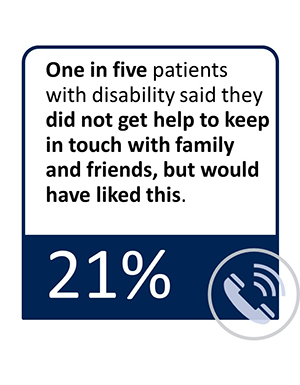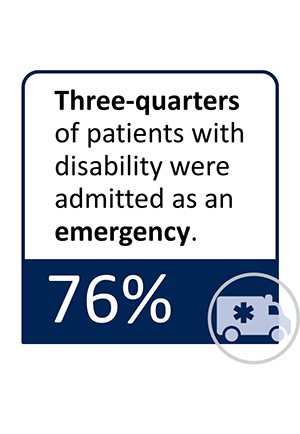Why do patients with disability report poorer experiences of inpatient care?
What is the Adult Inpatient Survey?
The Adult Inpatient Survey, commissioned by the Care Quality Commission (CQC), looks at the experiences of adults who have been inpatients at an NHS hospital. The survey has been running since 2002 and is published annually1. The survey also collects information about patients’ demographics (including characteristics protected by the Equality Act 2010, such as age, long-term condition, religion and ethnicity), in order to understand differences in care.
Experiences of patients with disability
People with disability are a sizeable and growing group of inpatients. They represent 22% of the general population, but 27% of Adult Inpatient Survey respondents2. Respondents with disability are also more likely to stay in hospital for longer: 78% of those with disability stayed two or more days in hospital, compared with 71% of those without. The number of people living with disability is increasing. When people with disability access health care they may face barriers, for example in communication, and receive poorer quality services. The 2021 Adult Inpatient Survey data provides us with a rich dataset from which to look at factors contributing to poorer experiences reported by patients living with disability.
Dignity and trust – the overall experience of inpatient care
Dignity is crucial in healthcare, and health professionals aim to treat every patient with respect. However, just three-quarters of patients with disability (74%) felt they were ‘always’ treated with dignity and respect while in hospital, compared with 85% of patients with no disability. Similarly, the proportion of patients with disability who ‘always’ had confidence and trust in the doctors and nurses treating them was 73% for doctors and 72% for nurses. This is lower than reported by patients with no disability (85% in for doctors and 82% for nurses).
It is therefore unsurprising that the overall experience of inpatient care for patients with disability is poorer. Two in five (43%) rated their experience as a 9 or 10 (where 10 is a ‘very good’ experience) compared with over half (55%) of patients with no disability.
Help from staff
Only a little over half (53%) of patients with disability said they were ‘always’ able to get help when needed, compared with two-thirds (67%) of patients with no disability. It is not clear to what extent this is related to greater need among this group, or fewer staff available to help them.

Similarly, a little over half (56%) of patients with disability said staff ‘always’ helped them to keep in touch with their family and friends, compared with 71% of patients with no disability. One in five (21%) patients with disability said they did not get help to keep in touch with family and friends, but would have liked this. Social isolation is cited by IDPWD as a factor contributing to poorer outcomes for people who live with disability. The 2021 Inpatient survey data shows that patients with disability are more likely to report ‘feeling isolated from others’, with 30% reporting they had experienced feeling isolated in the last 12 months, compared with 9% of patients not living with disability.
Communication with staff
Only half of patients with disability (50%) ‘always’ felt able to talk to a member of staff about their worries or fears, compared with 64% of patients with no disability. Twice as many (16%) patients with disability said they ‘never’ felt they could talk about their worries and fears, compared with 8% for patients with no disability.
Figure 1: Feeling able to talk to hospital staff by disability status
 Base: Respondents to Q51, Q52 and Q26 of the Adult Inpatient Survey: 2021 (Weighted: Disabled (14,931), Not disabled (34,885), Unweighted base (49,266)).
Base: Respondents to Q51, Q52 and Q26 of the Adult Inpatient Survey: 2021 (Weighted: Disabled (14,931), Not disabled (34,885), Unweighted base (49,266)).
Poor experiences of communication with hospital staff were also raised elsewhere in the survey. For example, when speaking to multiple members of staff in hospital, 16% of patients with disability said they were ‘often’ told different things, compared with only 9% of patients with no disability. Two-thirds (67%) of patients with no disability said it ‘never’ happened, compared with half (54%) of patients with disability.
Length of stay in hospital
Reducing length of stays in hospitals is one of the three key principles of the Transforming Care programme, which aims to improve the lives of children, young people and adults with a learning disability and/or autism. Analysis of the Inpatient data shows that patients living with disability are more likely to stay in hospital for two nights or longer compared with patients not living with disability: 78% of respondents with a disability stayed two or more days in hospital, compared with 71% of those without. In general, patients who stayed in hospital for two nights or longer reported a poorer experience in hospital, negatively impacting on responses to questions about consistency of information, trust in doctors and nurses, availability of staff, and being treated with respect. The increased likelihood of patients with disability staying in hospital for two nights or longer means they are more likely to report poorer experiences.
Emergency admission
 Data from the 2021 Adult Inpatient Survey shows that patients who were admitted to inpatient services as the result of an emergency (via A&E or an urgent treatment centre) reported poorer experiences than those who were admitted for elective (planned) care. Analysis of the data shows that patients living with disability were more likely to be admitted as the result of an emergency (76% of admissions) as opposed to patients not living with disability (65% of admissions). The IDPWD recognises that a lack of emergency preparedness for people with special needs leads to poorer outcomes; it is possible that the lack of emergency preparedness identified by IDPWD contributes to the poorer experiences reported in the 2021 Adult Inpatient Survey data.
Data from the 2021 Adult Inpatient Survey shows that patients who were admitted to inpatient services as the result of an emergency (via A&E or an urgent treatment centre) reported poorer experiences than those who were admitted for elective (planned) care. Analysis of the data shows that patients living with disability were more likely to be admitted as the result of an emergency (76% of admissions) as opposed to patients not living with disability (65% of admissions). The IDPWD recognises that a lack of emergency preparedness for people with special needs leads to poorer outcomes; it is possible that the lack of emergency preparedness identified by IDPWD contributes to the poorer experiences reported in the 2021 Adult Inpatient Survey data.
Conclusion
Patients with disability are at higher risk of reporting a poor inpatient experience than patients without. They are more likely to stay in hospital for two or more days and/or be admitted as the result of an emergency, both of which increase the risk that they will report poorer experiences. In addition, the survey data demonstrates that patients with disability are more likely to have experienced isolation in the last 12 months, compared with patients living without disability. This also puts patients with disability in a higher risk category.
This survey, and other surveys that measure people’s experiences of care, are vital for NHS Trusts to understand how they can improve their services to ensure all patients receive safe, effective and compassionate care.
More information can be found on the NHS Surveys website and the CQC website.
- The annual observance of the International Day of Persons with Disabilities on 3 December aims to promote an understanding of disability issues and mobilise support for the dignity, rights and well-being of persons with disabilities.
Research Notes
Note 1: A total of 166,318 patients were invited to participate in the 2021 Adult Inpatient Survey across 134 acute and specialist NHS trusts. Completed responses were received from 62,235 patients (an adjusted response rate of 39%).
Note 2: The Adult Inpatient Survey asks people who have had an inpatient stay whether they have any long-term physical or mental health conditions, disabilities or illnesses, and whether those conditions reduce their ability to carry out day-to-day activities. For this article, ‘disability’ is defined as having a long-term condition which reduces the ability to carry out day-to-day activities ‘a lot’. This is in line with the Equality Act 2010 which stipulates that someone is considered to be disabled if a physical or mental impairment has a ‘substantial’ and ‘long-term’ negative effect on their ability to carry out normal day-to-day activities.
Technical note
- Ipsos coordinates the Adult Inpatient Survey on behalf of the CQC. NHS trusts selected a sample of 1,250 patients, aged 16 or over, who had stayed at least one night in hospital during November 2021. The survey was conducted using a mixed methods approach, combining online and paper questionnaire modes. A total of 62,235 patients responded to the survey (an adjusted response rate of 39%) and fieldwork took place between January 2022 and May 2022.
- The subgroup analysis referred to in this blog compares how different groups of patients, with and without disabilities, rated their overall experiences of being a hospital inpatient. Responses to questions about their inpatient stay have been weighted, whereas grouping of patients (with or without disabilities, as well as by other demographics, such as feelings of isolation) remains unweighted. More information on this analysis and the questions included can be found on the NHS Surveys website: https://nhssurveys.org/






